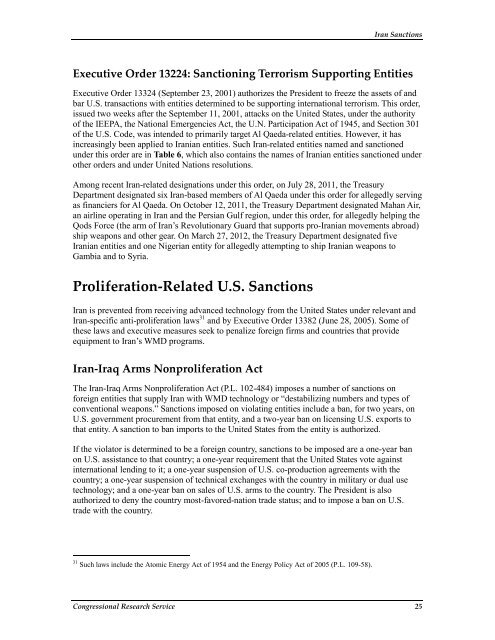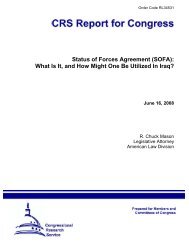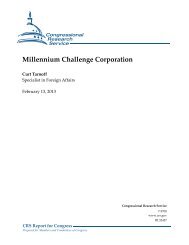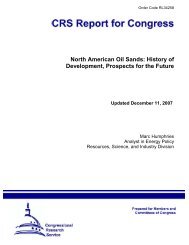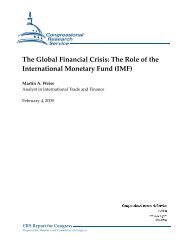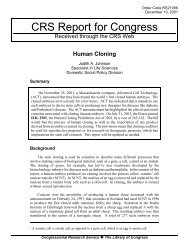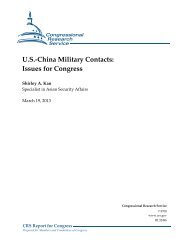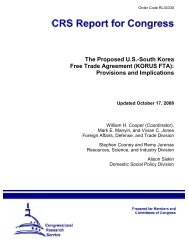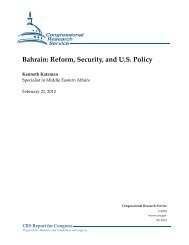Iran Sanctions - Foreign Press Centers
Iran Sanctions - Foreign Press Centers
Iran Sanctions - Foreign Press Centers
You also want an ePaper? Increase the reach of your titles
YUMPU automatically turns print PDFs into web optimized ePapers that Google loves.
<strong>Iran</strong> <strong>Sanctions</strong><br />
Executive Order 13224: Sanctioning Terrorism Supporting Entities<br />
Executive Order 13324 (September 23, 2001) authorizes the President to freeze the assets of and<br />
bar U.S. transactions with entities determined to be supporting international terrorism. This order,<br />
issued two weeks after the September 11, 2001, attacks on the United States, under the authority<br />
of the IEEPA, the National Emergencies Act, the U.N. Participation Act of 1945, and Section 301<br />
of the U.S. Code, was intended to primarily target Al Qaeda-related entities. However, it has<br />
increasingly been applied to <strong>Iran</strong>ian entities. Such <strong>Iran</strong>-related entities named and sanctioned<br />
under this order are in Table 6, which also contains the names of <strong>Iran</strong>ian entities sanctioned under<br />
other orders and under United Nations resolutions.<br />
Among recent <strong>Iran</strong>-related designations under this order, on July 28, 2011, the Treasury<br />
Department designated six <strong>Iran</strong>-based members of Al Qaeda under this order for allegedly serving<br />
as financiers for Al Qaeda. On October 12, 2011, the Treasury Department designated Mahan Air,<br />
an airline operating in <strong>Iran</strong> and the Persian Gulf region, under this order, for allegedly helping the<br />
Qods Force (the arm of <strong>Iran</strong>’s Revolutionary Guard that supports pro-<strong>Iran</strong>ian movements abroad)<br />
ship weapons and other gear. On March 27, 2012, the Treasury Department designated five<br />
<strong>Iran</strong>ian entities and one Nigerian entity for allegedly attempting to ship <strong>Iran</strong>ian weapons to<br />
Gambia and to Syria.<br />
Proliferation-Related U.S. <strong>Sanctions</strong><br />
<strong>Iran</strong> is prevented from receiving advanced technology from the United States under relevant and<br />
<strong>Iran</strong>-specific anti-proliferation laws 31 and by Executive Order 13382 (June 28, 2005). Some of<br />
these laws and executive measures seek to penalize foreign firms and countries that provide<br />
equipment to <strong>Iran</strong>’s WMD programs.<br />
<strong>Iran</strong>-Iraq Arms Nonproliferation Act<br />
The <strong>Iran</strong>-Iraq Arms Nonproliferation Act (P.L. 102-484) imposes a number of sanctions on<br />
foreign entities that supply <strong>Iran</strong> with WMD technology or “destabilizing numbers and types of<br />
conventional weapons.” <strong>Sanctions</strong> imposed on violating entities include a ban, for two years, on<br />
U.S. government procurement from that entity, and a two-year ban on licensing U.S. exports to<br />
that entity. A sanction to ban imports to the United States from the entity is authorized.<br />
If the violator is determined to be a foreign country, sanctions to be imposed are a one-year ban<br />
on U.S. assistance to that country; a one-year requirement that the United States vote against<br />
international lending to it; a one-year suspension of U.S. co-production agreements with the<br />
country; a one-year suspension of technical exchanges with the country in military or dual use<br />
technology; and a one-year ban on sales of U.S. arms to the country. The President is also<br />
authorized to deny the country most-favored-nation trade status; and to impose a ban on U.S.<br />
trade with the country.<br />
31 Such laws include the Atomic Energy Act of 1954 and the Energy Policy Act of 2005 (P.L. 109-58).<br />
Congressional Research Service 25


